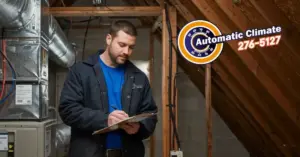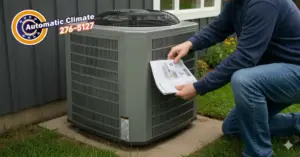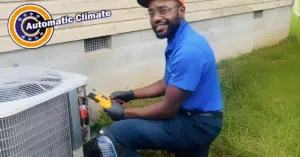What Can Cause My HVAC System to Leak Refrigerant? Uncovering the Frustrating Culprits!
Written by Cole Summers at Automatic Climate, Virginia.
Is your air conditioner blowing warm air? Hearing strange hissing sounds? Noticed an unexpected spike in your energy bills? These could all be frustrating signs of refrigerant leak issues, specifically a potential AC refrigerant leak. It’s a common problem homeowners in Richmond, VA, and beyond face, and frankly, it can be a real headache. Refrigerant, often known by the brand name Freon (though newer, more eco-friendly types are now standard), is the lifeblood of your air conditioning system. It’s the magic stuff that absorbs heat from inside your home and releases it outside, leaving you cool and comfortable. But when it starts escaping, your system’s efficiency plummets, comfort disappears, and potential damage looms. Understanding what causes an AC refrigerant leak is the first step towards fixing it and preventing future problems.
Many folks think AC systems “use up” refrigerant like a car uses gas, but that’s a myth. Your HVAC system is designed as a sealed or ‘hermetic’ system. The refrigerant should theoretically last the lifetime of the unit without needing a top-off. So, if your system is low on refrigerant, it almost *always* means there’s an AC refrigerant leak somewhere. Ignoring it won’t make it go away; in fact, it usually gets worse, leading to bigger problems and more expensive repairs down the line. Think about it – running your AC low on refrigerant is like driving your car low on oil. It puts immense strain on critical components, especially the compressor, which is the heart of your system. A minor AC refrigerant leak today could lead to a catastrophic compressor failure tomorrow.
Why Refrigerant is Crucial (And Why Leaks Are Bad News)

Before diving into the specific refrigerant leak causes, let’s quickly recap why this substance is so vital. Refrigerant undergoes continuous cycles of compression and expansion. In the evaporator coil (inside your home), it absorbs heat as it changes from a low-pressure liquid to a gas. Then, it travels to the condenser coil (outside), where it’s compressed back into a high-pressure liquid, releasing the absorbed heat. This cycle is what cools your air. An AC refrigerant leak disrupts this delicate balance. With less refrigerant, the system can’t absorb as much heat, leading to:
- Reduced Cooling: The most obvious symptom. Your home just doesn’t get as cold as it should.
- Increased Energy Consumption: The system runs longer and harder trying to reach the thermostat setting, causing energy bills to soar.
- Component Strain: Low refrigerant can cause the compressor to overheat and potentially fail – a very costly repair.
- Freezing Coils: Insufficient refrigerant causes the evaporator coil’s temperature to drop below freezing, leading to ice buildup. This blocks airflow and can cause water damage when it melts. This is a major sign of an AC refrigerant leak.
- Environmental Concerns: Older refrigerants like R-22 (a type of Freon) are harmful to the ozone layer. While newer refrigerants are better, leaks are still best avoided.
As Benjamin Franklin wisely said, “An ounce of prevention is worth a pound of cure.” This is especially true for HVAC systems. Addressing a small AC refrigerant leak early is far better than dealing with a major system breakdown later. Many homeowners unfortunately wait too long, hoping the problem resolves itself, only to face much larger bills when the system finally gives out completely. Don’t let that be you! Recognizing the potential refrigerant leak causes is key.
Our Trusted Partners
EXCELLENTTrustindex verifies that the original source of the review is Google. Aaron J. Visited our home later this evening to follow up with today’s install and the system checked out as it should. The only issue we had was connecting and setting up the wireless thermostat due to the app issues. He was very professional and patient. John and Joe replaced our 2nd floor gas heating system in a professional manner. Everything went smooth according to them and they finished the job in less time than expected. Aaron was professional and extremely thorough during his visit to our home. He took the time to explain the workings of our HVAC system and answered every question. To add to the above, I called the office and spoke with both Austin and Jason who were also very helpful while explaining the warranty and transfer of same. We are extremely pleased with Automatic Climate and will highly recommend to anyone who may ask for recommendations.
Owner's reply
Thank you for sharing your positive experience! We're thrilled Aaron, Austin, and Jason could assist you so thoroughly. Your recommendation means a lot, and we're glad we could help with your HVAC system and warranty details.Posted onTrustindex verifies that the original source of the review is Google. I had a very positive experience with them. They had better financing options, better prices, and were more responsive than other companies I got quotes from. Michael Chris and the whole team were fantastic. Highly recommendPosted onTrustindex verifies that the original source of the review is Google. Technician was on time, personable and professional. He throughly explained everything that he was going to do and identified any concerns. Very pleased with the overall experience and would recommend to other homeownersPosted onTrustindex verifies that the original source of the review is Google. I had the coils cleaned in my tankless water heater. Aaron Jernigan was so seemingly competent, so well-mannered, so good explaining what was going on, I am considering switching to Automatic Climate, I will definitely have all the vents in my house blown out in the near future.Posted onTrustindex verifies that the original source of the review is Google. Fast, friendly, knowledgeable and professional. Their associate, Casey J, helped fix our heat when we were enduring 20-30 degree nights. Thank you so much!!Posted onTrustindex verifies that the original source of the review is Google. Charlie was very dedicated. Provided excellent service. Very impressed with his dedication. Did check on HVAC and cleaned drier vent in Condo we purchased last summer.Posted onTrustindex verifies that the original source of the review is Google. I've been a customer of Automatic Climate for several years. I value the services of this firm. My commitment to renewing my maintenance contract year after year is directly related to the technical expertise of one of the company’s many representatives, Antonio Diaz. Antonio has kept all three of my units running smoothly for years, and when necessary forewarns me early of any pending issues. He offers solutions right away without long waits for follow up. I've never had to call the company back to correct any of his work. Antonio attributes his success and extraordinary customer service to the culture of Automatic Climate. I would recommend Antonio and Automatic Climate to any of my friends and neighbors. They're a company you can trust.
Owner's reply
Thank you so much for your kind words! We're thrilled to hear you had a positive experience with our service.Posted onTrustindex verifies that the original source of the review is Google. John & Nick were here today to clean our air ducts. They were very thorough and made sure that they left our home as clean as when they arrived. They explained the process clearly and worked efficiently. Great job!Verified by TrustindexTrustindex verified badge is the Universal Symbol of Trust. Only the greatest companies can get the verified badge who has a review score above 4.5, based on customer reviews over the past 12 months. Read more
Common Culprit #1: Vibration – The Constant Shakedown
Your HVAC system, particularly the outdoor unit (the condenser), vibrates during normal operation. It’s got motors, fans, and a compressor all working away. Over months and years, this constant vibration, even if seemingly minor, can take its toll. Think of it like a tiny, persistent earthquake happening right inside the unit. This shaking can slowly loosen joints and connections within the refrigerant lines. Clamps holding copper tubing might slip, allowing the tubing to rub against other metal parts or the unit’s frame. This friction eventually wears thin spots or even holes in the copper, creating a pathway for refrigerant to escape. It might start as a minuscule AC refrigerant leak, almost undetectable, but vibration ensures it often grows larger over time. Regular HVAC maintenance checks by professionals like us at Automatic Climate can often spot signs of vibration damage before a significant leak develops.
Common Culprit #2: Corrosion – The Slow Decay
Metal components, especially the copper tubing used extensively in evaporator and condenser coils, are susceptible to corrosion over time. This is particularly true for the outdoor unit, which is constantly exposed to the elements – rain, humidity, lawn chemicals, salt air (if you’re near the coast), and various airborne pollutants. Even indoor coils can corrode due to volatile organic compounds (VOCs) present in household air from things like cleaning supplies, air fresheners, or new carpeting. This corrosion, sometimes specifically formicary corrosion, creates microscopic pits and cracks in the metal tubing. These tiny imperfections are prime locations for an AC refrigerant leak. Because the holes are often minuscule (“pinhole leaks”), they can be very difficult to detect initially, leading to a slow, steady loss of refrigerant over months or even years. You might only notice the effects gradually as your system becomes less efficient. This is one of the most insidious refrigerant leak causes because it happens quietly over long periods.
Common Culprit #3: Wear and Tear – The Aging Process
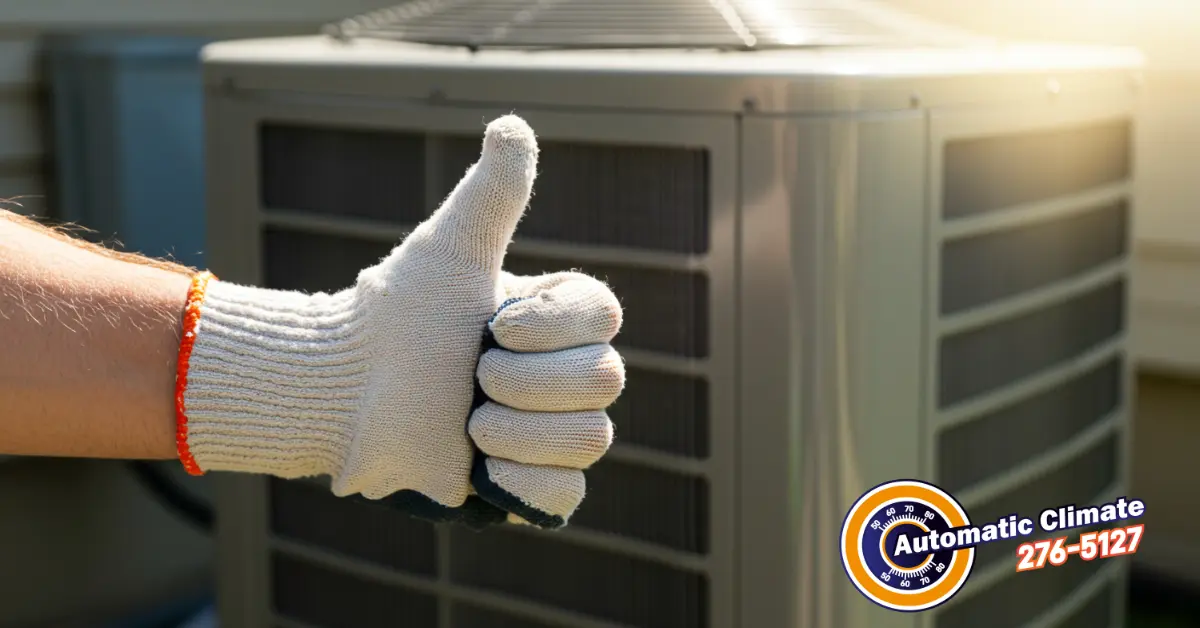
Like any mechanical system, your air conditioner ages. Components simply wear out through normal use. Rubber seals around service valves (used by technicians to check refrigerant levels) can degrade, dry out, and crack over time, allowing refrigerant to seep out. Joints and connections, particularly flared connections or brazed joints, can weaken with age and thermal stress (the constant heating and cooling cycles). Think about the stress on these parts – expanding when hot, contracting when cold, day after day, year after year. Eventually, something might give way, resulting in an AC refrigerant leak. This is often why older systems are more prone to leaks than newer ones. It’s just the natural consequence of materials reaching the end of their service life. It’s not necessarily a defect, just a reality of mechanical systems. This makes regular inspections even more critical for older units, as catching wear and tear before it causes a major AC refrigerant leak can save significant hassle.
Understanding these primary refrigerant leak causes helps you appreciate why maintenance is so important. Many leaks develop gradually due to these factors. Catching them early is key to preventing costly repairs and ensuring your system runs efficiently. An AC refrigerant leak isn’t just an inconvenience; it’s a sign that your system needs attention.
Beyond these core issues, other factors can contribute to an AC refrigerant leak. Physical damage is a less common but significant cause. Perhaps a falling tree branch hits the outdoor unit, or maybe lawn equipment accidentally strikes the refrigerant lines running between the indoor and outdoor units. Even shifting foundations can sometimes put stress on the lines where they enter the house. Factory defects, while rare in reputable brands, can occasionally occur. A poorly brazed joint or a component that wasn’t manufactured to spec might fail prematurely. Similarly, improper installation can lead to problems. If connections weren’t tightened correctly, if lines were bent too sharply, or if the wrong type of solder was used, leaks can develop soon after installation or years later. This highlights the importance of choosing qualified, experienced installers like the team at Automatic Climate. We ensure every installation meets rigorous standards to minimize the risk of future problems, including the dreaded AC refrigerant leak.
SKip The Line! Schedule Your HVAC Service by Booking Online Now.
Get in Touch
Contact Us
The type of refrigerant itself doesn’t usually *cause* a leak, but the transition away from older refrigerants like R-22 is relevant. Systems designed for R-22 operate at different pressures than newer systems using R-410A or other alternatives. Attempting to use the wrong refrigerant or improperly retrofitting a system can lead to leaks or component failure. If you have an older R-22 system experiencing an AC refrigerant leak, repair options might be limited or very expensive due to the R-22 phase-out. Often, replacement with a modern, efficient system is the more cost-effective long-term solution. We can help you evaluate the best course of action if you suspect an AC refrigerant leak in an older unit. Remember, simply “topping off” a leaking system without fixing the leak is not a sustainable solution and is often against regulations, especially for older refrigerants.
So, we’ve covered vibration, corrosion, wear and tear, physical damage, and even installation issues as potential refrigerant leak causes. It seems like a lot can go wrong! But don’t despair. Most systems run reliably for years without issue, especially with proper care. The key takeaway is that if you suspect an AC refrigerant leak, don’t ignore the signs. Prompt attention is crucial.
Common Causes of AC Refrigerant Leaks at a Glance
Vibration Damage
Constant shaking from motors and fans loosens joints and causes tubing to rub against components, wearing holes over time. A frequent AC refrigerant leak source.
Corrosion
Exposure to elements, humidity, and airborne chemicals causes microscopic pits/cracks (pinhole leaks) in copper coils and lines. A sneaky AC refrigerant leak cause.
Wear and Tear
Natural aging degrades rubber seals on service valves and weakens joints/connections due to thermal stress, leading to an eventual AC refrigerant leak.
Physical Damage
Impacts from falling objects, lawn equipment accidents, or even shifting foundations can puncture or stress refrigerant lines, causing an immediate AC refrigerant leak.
Installation/Factory Defects
Improperly tightened fittings, poorly brazed joints, or rare manufacturing flaws can create weak points prone to developing an AC refrigerant leak.
Sources: Insights from PanoramaNOW and Herzing Blog.
Spotting the Telltale Signs: Is Your AC Leaking Refrigerant?
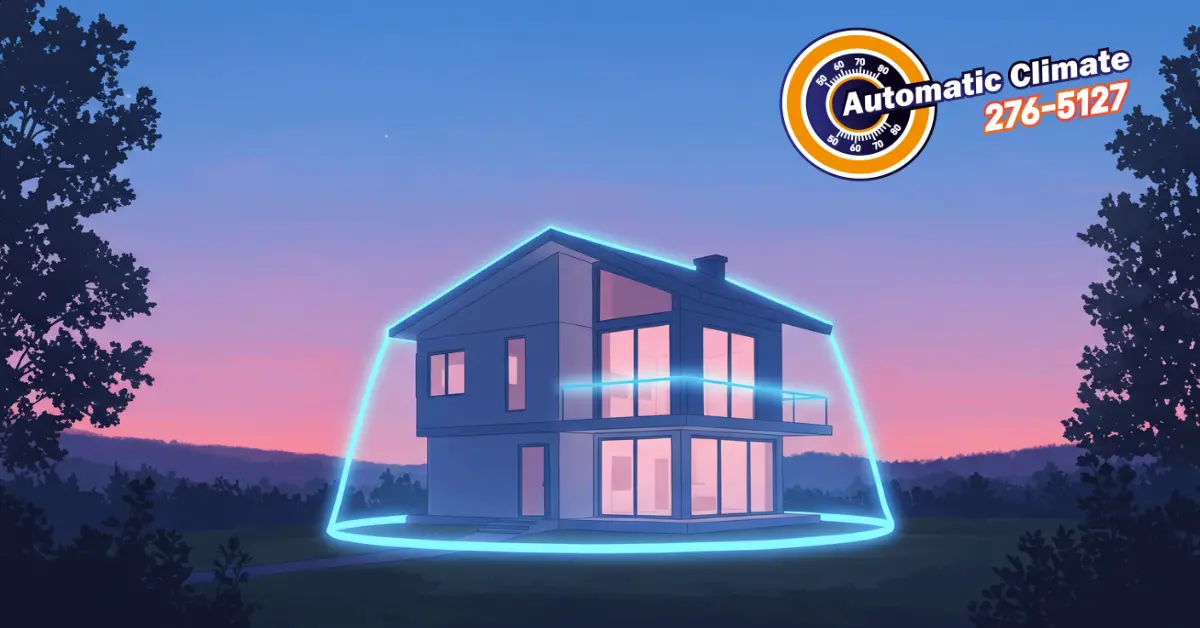
Okay, so we know *why* an AC refrigerant leak might happen, but how do you know if *your* system has sprung one? Sometimes the signs are subtle, other times they’re annoyingly obvious. Being vigilant can help you catch a problem early, potentially saving you from more extensive damage and higher repair costs. Ignoring these signs of refrigerant leak is never a good idea.
Sign #1: Reduced Cooling Performance
This is often the first thing homeowners notice. Your air conditioner just isn’t cooling like it used to. You might find yourself constantly lowering the thermostat setting, but the air coming from the vents feels lukewarm or just not as crisp and cold as expected. The system might run almost continuously without ever reaching the desired temperature, especially on hot Richmond days. This inefficiency is a classic symptom of low refrigerant due to an AC refrigerant leak. The system simply doesn’t have enough “cooling power” to do its job effectively.
Sign #2: Increased Energy Bills
When your AC has to work harder and run longer to compensate for low refrigerant levels caused by an AC refrigerant leak, it uses significantly more electricity. If you notice your monthly energy bills suddenly jump higher than usual during cooling season (compared to previous years or similar weather periods), it’s a red flag. While other issues can cause high bills, an unexplained spike often points towards a loss of efficiency, and an AC refrigerant leak is a prime suspect. It’s your wallet’s way of telling you something’s wrong!
Sign #3: Frozen Evaporator Coils
This one might seem counterintuitive – why would a *lack* of cold stuff cause freezing? Here’s the deal: when refrigerant levels are correct, the evaporator coil (the indoor one) stays just above freezing while absorbing heat. If there’s an AC refrigerant leak and levels drop too low, the pressure within the coil also drops. This causes the remaining refrigerant to become *too* cold, well below freezing point. Moisture from the air passing over these super-chilled coils then freezes instantly, building up a layer of ice or frost. You might see ice on the coil itself (if accessible) or on the refrigerant lines connected to it. This ice blocks airflow, further reducing cooling and efficiency. If you see ice, it’s a strong indicator you need to investigate a potential AC refrigerant leak or airflow problem.
Sign #4: Hissing or Bubbling Sounds
Listen closely to your HVAC system, both indoors and outdoors. A distinct hissing sound, especially near the refrigerant lines or coils, can indicate refrigerant gas escaping through a small hole or crack – a definite AC refrigerant leak. If the leak is larger or involves liquid refrigerant escaping, you might hear a gurgling or bubbling sound. These noises aren’t normal operating sounds and warrant immediate investigation by a professional. Think of it like a tiny puncture in a tire; you can often hear the air escaping. It’s the same principle with an AC refrigerant leak.
Sign #5: Water Leaks Around the Indoor Unit
Remember that frozen evaporator coil we talked about? When the AC cycles off, or if the ice buildup gets extensive, that ice will eventually melt. This can produce more water than the condensate drain pan and line are designed to handle, leading to overflow and water pooling around your indoor unit (air handler or furnace). While a clogged drain line can also cause water leaks, freezing coils due to an AC refrigerant leak are another common culprit. So, if you see puddles, don’t just mop them up – figure out *why* they’re happening. It could be linked back to that pesky AC refrigerant leak.
Sign #6: Increased Indoor Humidity
Part of your air conditioner’s job is to dehumidify your home’s air as it cools it. When an AC refrigerant leak compromises the system’s ability to cool effectively, it also hampers its dehumidification capabilities. If your home starts feeling unusually damp or muggy even when the AC is running, it could be another subtle sign that your refrigerant levels are low. This excess humidity isn’t just uncomfortable; it can also contribute to mold growth.
Recognizing these signs of refrigerant leak is crucial. If you notice one or more of these symptoms, it’s time to call in the professionals. Attempting to diagnose or fix refrigerant leak issues yourself is generally not recommended. Refrigerant handling requires specific tools, training, and EPA certification due to the potential environmental and safety risks. Plus, accurately finding the source of an AC refrigerant leak often requires specialized equipment like electronic leak detectors or nitrogen pressure tests.
It’s worth noting that some of these symptoms can overlap with other HVAC problems. For instance, reduced airflow and freezing coils can also be caused by a severely clogged air filter or a malfunctioning blower motor. That’s why professional diagnosis is so important. A qualified technician from Automatic Climate can systematically check your system, rule out other potential causes, and pinpoint whether an AC refrigerant leak is truly the issue, and if so, where it’s located. We use sophisticated tools and techniques to find even the smallest leaks that might otherwise go undetected.
Consider the long-term implications. Continuously running an AC with a refrigerant leak not only wastes energy and money but also puts excessive strain on the compressor. The compressor is typically the most expensive component in your AC system. Allowing a leak to persist significantly increases the risk of compressor failure, potentially turning a moderate repair job into a major replacement expense. Addressing the AC refrigerant leak promptly protects your investment and ensures your system’s longevity. Don’t let a small issue snowball into a costly disaster. Being proactive about identifying and fixing an AC refrigerant leak is always the smarter, more economical choice in the long run.
The technology visionary Steve Jobs once said, “Details matter, it’s worth waiting to get it right.” While waiting isn’t advisable for an AC refrigerant leak, getting the diagnosis and repair *right* certainly matters. A quick, incorrect fix or simply adding more refrigerant without finding the leak source is just kicking the can down the road. A proper repair involves locating the leak, fixing the damaged component (patching, replacing a section of tubing, tightening a connection, replacing a valve or coil), pressure testing the system to ensure the leak is sealed, evacuating the system to remove air and moisture, and then recharging with the precise amount of the correct type of refrigerant. It’s a detailed process, but it’s the only way to ensure a lasting solution to your AC refrigerant leak problem.

Preventative Maintenance: Avoiding Future Leaks
Regular care can significantly reduce the risk of developing an AC refrigerant leak. Here are key HVAC maintenance tips:
Schedule Annual Tune-Ups
Have a professional inspect your system yearly. Technicians check refrigerant levels, inspect lines/coils for corrosion or damage, tighten connections, and catch potential AC refrigerant leak issues early.
Replace Air Filters Regularly
Dirty filters restrict airflow, causing pressure changes and potential coil freezing, which can stress components and indirectly contribute to AC refrigerant leak risks. Change filters every 1-3 months.
Clear Outdoor Unit Debris
Keep leaves, grass clippings, shrubs, and dirt away from the outdoor condenser unit (at least 2 feet clearance). Good airflow prevents overheating and reduces corrosion risk, lowering AC refrigerant leak potential.
Protect Refrigerant Lines
Be careful when doing yard work near the exposed refrigerant lines running between units. Avoid hitting them with mowers or trimmers to prevent physical damage causing an AC refrigerant leak.
Sources: Maintenance best practices highlighted and general HVAC guidelines.
Okay, I Suspect a Leak… Now What? The Repair Process
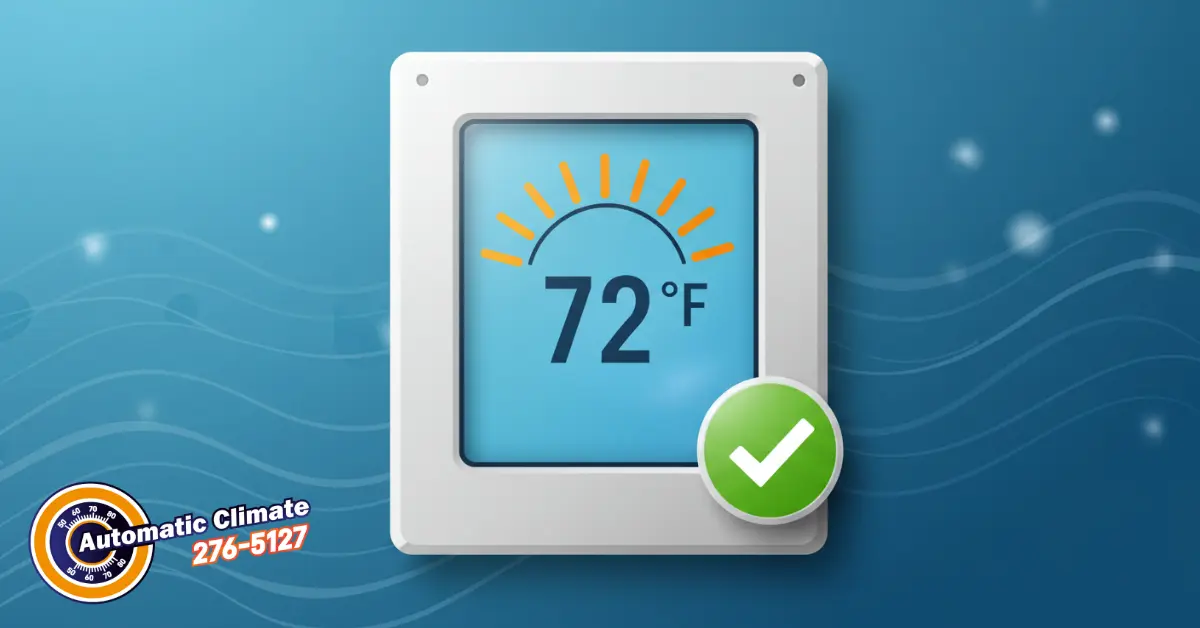
So you’ve noticed the signs – poor cooling, weird noises, maybe even ice. You strongly suspect an AC refrigerant leak. What’s the next step? Resist the urge to grab a wrench or, worse, buy one of those DIY “AC recharge” kits. Handling refrigerant is tricky and potentially hazardous, and simply adding more without fixing the leak is like putting a band-aid on a broken bone – it doesn’t solve the underlying problem and can even cause more damage if the system is overcharged. The correct approach is to call a qualified HVAC professional. Here’s generally what to expect when you call Automatic Climate to fix refrigerant leak issues:
Step 1: Diagnosis and Leak Detection
Our certified technician will first confirm that low refrigerant is indeed the issue and not something else (like a dirty filter or thermostat problem). We’ll check system pressures and temperatures. If low refrigerant is confirmed, the hunt for the AC refrigerant leak begins. This is often the most time-consuming part. We use several methods:
- Visual Inspection: Looking for obvious signs like oily residue around fittings, joints, or coils (refrigerant often carries oil with it).
- Electronic Leak Detector: A handheld device that “sniffs” the air for refrigerant molecules, pinpointing the general area of the AC refrigerant leak.
- Soap Bubble Test: Applying a special bubble solution to suspected areas. Escaping refrigerant will create visible bubbles, confirming the exact spot of the AC refrigerant leak.
- Ultraviolet (UV) Dye Test: Adding a fluorescent dye to the refrigerant and running the system. The dye escapes with the refrigerant, and using a UV light, the technician can see glowing traces at the leak site. This is great for finding very small or intermittent leaks.
- Nitrogen Pressure Test: If the leak is very hard to find, the technician might recover the existing refrigerant, pressurize the system with inert nitrogen gas, and listen for hissing or use the bubble test again. This helps find leaks that only appear under higher pressure.
Finding the source of the AC refrigerant leak is critical. Without knowing where it’s coming from, a proper repair is impossible.
Step 2: Repairing the Leak
Once the AC refrigerant leak is located, the repair method depends on where it is and how severe it is:
- Tightening Fittings: Sometimes, it’s as simple as a loose connection (like a Schrader valve core or a flare nut) that just needs tightening.
- Brazing/Welding: Small holes or cracks in copper tubing can often be repaired by brazing (a high-temperature soldering process) to seal the leak.
- Component Replacement: If the leak is in a component like the evaporator coil or condenser coil and the damage is extensive (e.g., widespread corrosion, multiple leaks), or if a valve is faulty, replacing the entire component might be necessary. This is often more reliable than attempting multiple patches on a failing part. Replacing a coil is a significant repair, but it ensures the AC refrigerant leak is permanently fixed in that area.
- Line Set Replacement: If the refrigerant lines running between the indoor and outdoor units are damaged, replacing that section of tubing (the line set) might be required.
Step 3: System Evacuation and Recharge
After the AC refrigerant leak is repaired, the system can’t just be refilled. Air and moisture likely entered the system while it was open or leaking. These contaminants are terrible for HVAC systems – moisture can freeze and cause blockages or mix with refrigerant to form corrosive acids. So, the technician uses a vacuum pump to evacuate the system, removing all air, moisture, and other non-condensables. This process can take 30 minutes to several hours, depending on the system size and contamination level. Once a deep vacuum is achieved and holds steady (confirming the repair is solid and there are no other leaks), the technician recharges the system with the precise weight of the correct type of refrigerant, as specified by the manufacturer. This precise charge is crucial for optimal performance and efficiency. Overcharging or undercharging can cause problems almost as bad as the original AC refrigerant leak.
Step 4: Testing and Verification
Finally, the technician will start the system, let it run for a while, and check pressures, temperatures (like the temperature drop across the evaporator coil), and overall cooling performance to ensure the AC refrigerant leak repair was successful and the system is operating correctly. They might do one last check around the repair area with the electronic leak detector for peace of mind.
As you can see, properly addressing an AC refrigerant leak is a multi-step process requiring specialized knowledge and tools. It’s not a quick top-off. Choosing a reputable company like Automatic Climate ensures the job is done right, providing a lasting solution and restoring your home comfort. We stand by our work and aim to resolve your AC refrigerant leak issues effectively and efficiently.
The cost to fix refrigerant leak problems can vary widely depending on the location and severity of the leak, the type of refrigerant needed, and whether components need replacement. A simple valve tightening and recharge will cost much less than replacing an entire evaporator coil. However, investing in a proper repair is almost always more cost-effective than letting the leak continue or opting for repeated, temporary top-offs. Consider the energy savings from restoring efficiency and the prevention of much costlier compressor damage. An AC refrigerant leak is an investment in your system’s health and your long-term comfort.
Famous inventor Charles Kettering noted, “High achievements always take place in the framework of high expectations.” We at Automatic Climate have high expectations for our technicians and the quality of our repairs. When we address an AC refrigerant leak, we aim not just to stop the leak but to restore your system to optimal performance, ensuring you have reliable cooling when you need it most. Dealing with an AC refrigerant leak is frustrating, but with the right approach, it’s a solvable problem.

Experiencing AC Issues in Richmond, VA?
Don’t sweat a potential AC refrigerant leak! The experienced, certified technicians at Automatic Climate are here to help. Since 1983, we’ve provided reliable AC repair and maintenance services.
We use state-of-the-art equipment to accurately diagnose and fix refrigerant leaks quickly and effectively. Get your cool air back!
Or Call Us: (804) 803-1983
Case Study: The Mysterious Warm Air
A Richmond homeowner noticed their 8-year-old AC wasn’t cooling effectively. Energy bills were creeping up. They suspected an AC refrigerant leak. Our technician performed a thorough inspection.
Diagnosis: Using an electronic detector, a small AC refrigerant leak was found at a corroded joint on the indoor evaporator coil – a common issue (corrosion being a frequent cause).
Solution: The technician carefully cleaned the area, brazed the joint to seal the leak, performed a pressure test, evacuated the system, and recharged it to the correct level.
Result: The AC’s cooling performance was fully restored, and the homeowner noticed a drop in their next energy bill. Addressing the AC refrigerant leak promptly prevented further damage.
Illustrative example based on common service calls.
The Takeaway: Be Proactive About Refrigerant Leaks

Dealing with an AC refrigerant leak is undoubtedly a nuisance. It disrupts your comfort, costs money to fix, and can lead to bigger problems if ignored. However, understanding the common causes – vibration, corrosion, wear and tear, physical damage, and installation issues – empowers you as a homeowner. Knowing the telltale signs – poor cooling, high bills, frozen coils, hissing sounds, water leaks, and excess humidity – allows you to act quickly when you suspect an AC refrigerant leak.
Prevention, primarily through regular professional HVAC maintenance, is your best defense. Annual tune-ups give technicians a chance to inspect for potential weak spots, signs of corrosion, or loose fittings before they turn into a full-blown AC refrigerant leak. Simple homeowner tasks like changing filters regularly and keeping the outdoor unit clear also contribute significantly to system health and longevity, reducing the likelihood of problems, including the frustrating AC refrigerant leak.
If you do suspect a leak, remember that a proper repair involves more than just adding refrigerant. Accurate leak detection, fixing the source of the problem, and correctly recharging the system are all crucial steps. Attempting DIY repairs on the refrigerant circuit is generally unsafe and ineffective. Trusting certified professionals like the team at Automatic Climate ensures the job is done correctly and safely, resolving your AC refrigerant leak issue for the long term.
An AC refrigerant leak might seem like a small thing initially, but its impact on your system’s performance, your energy bills, and its overall lifespan can be substantial. Don’t underestimate the importance of this sealed system component. Treat any potential AC refrigerant leak seriously and address it promptly. Your comfort and your wallet will thank you later. Living in Richmond means relying on your AC during those hot, humid summers. Ensuring it’s free from issues like an AC refrigerant leak is key to staying cool and comfortable without breaking the bank.
Think of your HVAC system as an investment in your home and well-being. Like any investment, it requires occasional attention and care to perform optimally. Ignoring potential problems like an AC refrigerant leak is akin to neglecting maintenance on your car – it might seem fine for a while, but eventually, a more significant, more expensive failure is likely. The minor cost and inconvenience of addressing an AC refrigerant leak early pale in comparison to the potential cost of replacing a failed compressor or dealing with extensive water damage from melting ice.
Furthermore, being environmentally conscious plays a role. While newer refrigerants are less harmful than older ones like R-22, they are still potent greenhouse gases. Preventing an AC refrigerant leak helps minimize environmental impact. Responsible HVAC service includes not only fixing leaks but also properly recovering refrigerant during service and disposal, adhering to EPA regulations (as outlined by the EPA). When you choose Automatic Climate, you choose a company committed to both technical excellence and environmental responsibility in handling every AC refrigerant leak situation.
Ultimately, knowledge is power. By understanding the potential causes and signs of an AC refrigerant leak, you’re better equipped to protect your HVAC system and maintain a comfortable home environment. Don’t hesitate to reach out to us at Automatic Climate if you have any concerns or questions about a potential AC refrigerant leak or any other HVAC issue. We’re here to provide expert advice and reliable service to the Richmond community, just as we have since 1983.
Frequently Asked Questions About AC Refrigerant Leaks
1. Is an AC refrigerant leak dangerous?
While refrigerant itself isn’t typically flammable, inhaling concentrated amounts can be harmful, causing dizziness, shortness of breath, or other symptoms. Direct skin contact can cause frostbite. The main danger is usually the system malfunction it causes, but significant leaks in enclosed spaces should be addressed immediately. (Source: Air & Energy NWFL)
2. Can I just add more refrigerant if I have a leak?
No, this is not a proper fix. It doesn’t address the source of the AC refrigerant leak, meaning it will just leak out again. It’s also illegal to intentionally release refrigerant, and repeatedly topping off without repair is often against regulations. Plus, overcharging can damage your system. The leak must be found and repaired first.
3. How long does it take to fix an AC refrigerant leak?
It varies greatly. Finding the AC refrigerant leak can sometimes take longer than the repair itself, ranging from under an hour to several hours for difficult leaks. The repair, evacuation, and recharge add more time. Simple fixes might take 2-3 hours total, while complex repairs like coil replacement can take significantly longer.
4. What are the most common refrigerant leak causes?
The most frequent culprits include vibration loosening connections, corrosion creating pinholes in coils/lines, general wear and tear on seals and joints, and sometimes physical damage to the unit or lines. (Source: Herzing Blog)
5. Why is my AC freezing up? Is it always an AC refrigerant leak?
Low refrigerant from an AC refrigerant leak is a very common cause of frozen evaporator coils. However, severely restricted airflow (e.g., extremely dirty filter, blocked vents, failing blower motor) can also cause freezing. A technician needs to diagnose the root cause.
6. Can an AC refrigerant leak cause water damage?
Yes, indirectly. If the leak causes the evaporator coil to freeze, the melting ice can overwhelm the condensate drain system, leading to water overflowing and potentially damaging surrounding areas.
7. How often should refrigerant be checked?
Ideally, refrigerant levels and system pressures should be checked during annual professional HVAC maintenance tune-ups. Unless you suspect a problem (like poor cooling), yearly checks are usually sufficient to catch a developing AC refrigerant leak early.
8. What’s the difference between Freon and refrigerant?
“Freon” is a brand name (like Kleenex for tissues) that became synonymous with older refrigerants, particularly R-22 (HCFC-22). “Refrigerant” is the general term for the chemical compounds used in cooling cycles. Modern systems use newer, non-Freon refrigerants like R-410A. An AC refrigerant leak can involve any type.
9. Can an AC refrigerant leak make noise?
Yes. Small leaks often produce a faint hissing sound as the gas escapes under pressure. Larger leaks might create a gurgling or bubbling noise. These are key signs of refrigerant leak issues.
10. Is fixing an AC refrigerant leak expensive?
Costs vary widely. A simple fix (like tightening a valve) plus recharge might be relatively inexpensive. However, if a major component like a coil needs replacement, the cost can be significant. Getting an estimate from a qualified technician is essential. (Source: Angi)
11. Does homeowners insurance cover AC refrigerant leaks?
Generally, standard homeowners insurance does *not* cover HVAC repairs due to normal wear and tear, which is often the cause of an AC refrigerant leak. However, if the leak was caused by a covered peril (like a tree falling on the unit), there might be coverage. Check your specific policy.
12. Can an AC refrigerant leak affect indoor air quality?
Yes, especially if the leak is significant and occurs indoors. Escaping refrigerant gas displaces oxygen. Additionally, the increased humidity caused by poor AC performance can promote mold and mildew growth, negatively impacting air quality.
13. My AC is old. Should I repair the leak or replace the unit?
This depends on the age, the overall condition of the unit, the cost of the AC refrigerant leak repair, and the type of refrigerant it uses (R-22 repairs are often prohibitively expensive). If the repair cost is high (e.g., coil replacement) and the unit is over 10-12 years old, replacement with a new, more efficient system might be a better long-term investment.
14. What is the “bubble test” for finding leaks?
Technicians spray a soapy water solution onto suspected leak areas (joints, valves, coil connections). If refrigerant is escaping, it will blow bubbles in the soap solution, pinpointing the exact location of the AC refrigerant leak. (Source: Home Depot)
15. Why does my technician need to use a vacuum pump after fixing the leak?
Opening the refrigerant lines allows air and moisture to enter. These contaminants must be removed before recharging. The vacuum pump boils off moisture at room temperature and removes air, ensuring the system contains only pure refrigerant for proper operation after fixing the AC refrigerant leak.
16. Can running the AC with a known leak damage the compressor?
Yes, absolutely. Low refrigerant causes the compressor to run hotter and harder, leading to overheating and potential failure. The compressor is the most expensive part of the AC system, so addressing an AC refrigerant leak promptly is crucial to protect it.
17. Are there different types of refrigerant leaks?
Leaks can range from tiny “pinhole” leaks caused by corrosion, which release refrigerant very slowly, to larger cracks or failed seals that cause rapid loss. The location also matters – leaks in coils are common but can be harder to fix than leaks at accessible fittings. Identifying the type helps determine the best repair for the AC refrigerant leak.
18. Does the outdoor temperature affect leak detection?
Extreme cold can sometimes make leaks harder to detect as system pressures are lower. However, professional technicians have methods (like nitrogen pressure testing) to find an AC refrigerant leak regardless of ambient temperature.
19. What is R-22 refrigerant and why is it being phased out?
R-22 (an HCFC often called Freon) was a common refrigerant for decades but was found to deplete the Earth’s ozone layer. Due to environmental regulations (Montreal Protocol and Clean Air Act), its production and import were phased out in the US as of 2020. Systems with an R-22 AC refrigerant leak are expensive to recharge. (Source: US EPA)
20. Who should I call to fix an AC refrigerant leak?
You should always call a qualified, licensed, and insured HVAC contractor with EPA-certified technicians, like Automatic Climate. They have the training, tools, and certification required to safely handle refrigerants and properly diagnose and repair your AC refrigerant leak.
Further Reading & Resources
- Lennox: How to identify an AC Refrigerant leak – Good overview of signs.
- PanoramaNOW: Common Causes of AC Refrigerant Leaks – Focuses on why leaks happen.
- Home Depot: How to Find & Fix AC Freon Leaks – Details detection and repair steps.
- Herzing Blog: Refrigerant Leak Causes & Tests – Technical insights into causes.
- US EPA: Homeowner FAQs on Refrigerants – Information on regulations and phase-outs.
Legal Disclaimer:
This article was drafted with the assistance of a Large Language Model, specifically Gemini, which was used for initial drafting and article outlining. The content was subsequently reviewed, edited, and fact-checked by a human writer to ensure accuracy, clarity, and adherence to editorial standards. While AI assisted in the creation of this content, the human author(s) retain editorial control and full responsibility for the final content, including its accuracy and integrity. Readers should be aware that AI-generated content may present limitations, and the information provided should be considered with this in mind.
The information provided in this article is for general informational purposes only. While we strive to keep the information up-to-date and correct, we make no representations or warranties of any kind, express or implied, about the completeness, accuracy, reliability, suitability, or availability with respect to the 1 article or the information, products, services, or related graphics contained in the article for any purpose. Any reliance you place on such information is therefore strictly at your own risk. 2 HVAC systems involve electrical components, refrigerant, and potentially natural gas; attempting repairs without proper training and safety precautions can result in injury, property damage, or voiding warranties. Always consult with a qualified and licensed HVAC professional, like those at Automatic Climate (https://www.automaticclimate.com/, (804) 803-1983), for diagnosis and repair of HVAC issues.Our Trusted Partners
EXCELLENTTrustindex verifies that the original source of the review is Google. Aaron J. Visited our home later this evening to follow up with today’s install and the system checked out as it should. The only issue we had was connecting and setting up the wireless thermostat due to the app issues. He was very professional and patient. John and Joe replaced our 2nd floor gas heating system in a professional manner. Everything went smooth according to them and they finished the job in less time than expected. Aaron was professional and extremely thorough during his visit to our home. He took the time to explain the workings of our HVAC system and answered every question. To add to the above, I called the office and spoke with both Austin and Jason who were also very helpful while explaining the warranty and transfer of same. We are extremely pleased with Automatic Climate and will highly recommend to anyone who may ask for recommendations.
Owner's reply
Thank you for sharing your positive experience! We're thrilled Aaron, Austin, and Jason could assist you so thoroughly. Your recommendation means a lot, and we're glad we could help with your HVAC system and warranty details.Posted onTrustindex verifies that the original source of the review is Google. I had a very positive experience with them. They had better financing options, better prices, and were more responsive than other companies I got quotes from. Michael Chris and the whole team were fantastic. Highly recommendPosted onTrustindex verifies that the original source of the review is Google. Technician was on time, personable and professional. He throughly explained everything that he was going to do and identified any concerns. Very pleased with the overall experience and would recommend to other homeownersPosted onTrustindex verifies that the original source of the review is Google. I had the coils cleaned in my tankless water heater. Aaron Jernigan was so seemingly competent, so well-mannered, so good explaining what was going on, I am considering switching to Automatic Climate, I will definitely have all the vents in my house blown out in the near future.Posted onTrustindex verifies that the original source of the review is Google. Fast, friendly, knowledgeable and professional. Their associate, Casey J, helped fix our heat when we were enduring 20-30 degree nights. Thank you so much!!Posted onTrustindex verifies that the original source of the review is Google. Charlie was very dedicated. Provided excellent service. Very impressed with his dedication. Did check on HVAC and cleaned drier vent in Condo we purchased last summer.Posted onTrustindex verifies that the original source of the review is Google. I've been a customer of Automatic Climate for several years. I value the services of this firm. My commitment to renewing my maintenance contract year after year is directly related to the technical expertise of one of the company’s many representatives, Antonio Diaz. Antonio has kept all three of my units running smoothly for years, and when necessary forewarns me early of any pending issues. He offers solutions right away without long waits for follow up. I've never had to call the company back to correct any of his work. Antonio attributes his success and extraordinary customer service to the culture of Automatic Climate. I would recommend Antonio and Automatic Climate to any of my friends and neighbors. They're a company you can trust.
Owner's reply
Thank you so much for your kind words! We're thrilled to hear you had a positive experience with our service.Posted onTrustindex verifies that the original source of the review is Google. John & Nick were here today to clean our air ducts. They were very thorough and made sure that they left our home as clean as when they arrived. They explained the process clearly and worked efficiently. Great job!Verified by TrustindexTrustindex verified badge is the Universal Symbol of Trust. Only the greatest companies can get the verified badge who has a review score above 4.5, based on customer reviews over the past 12 months. Read more







